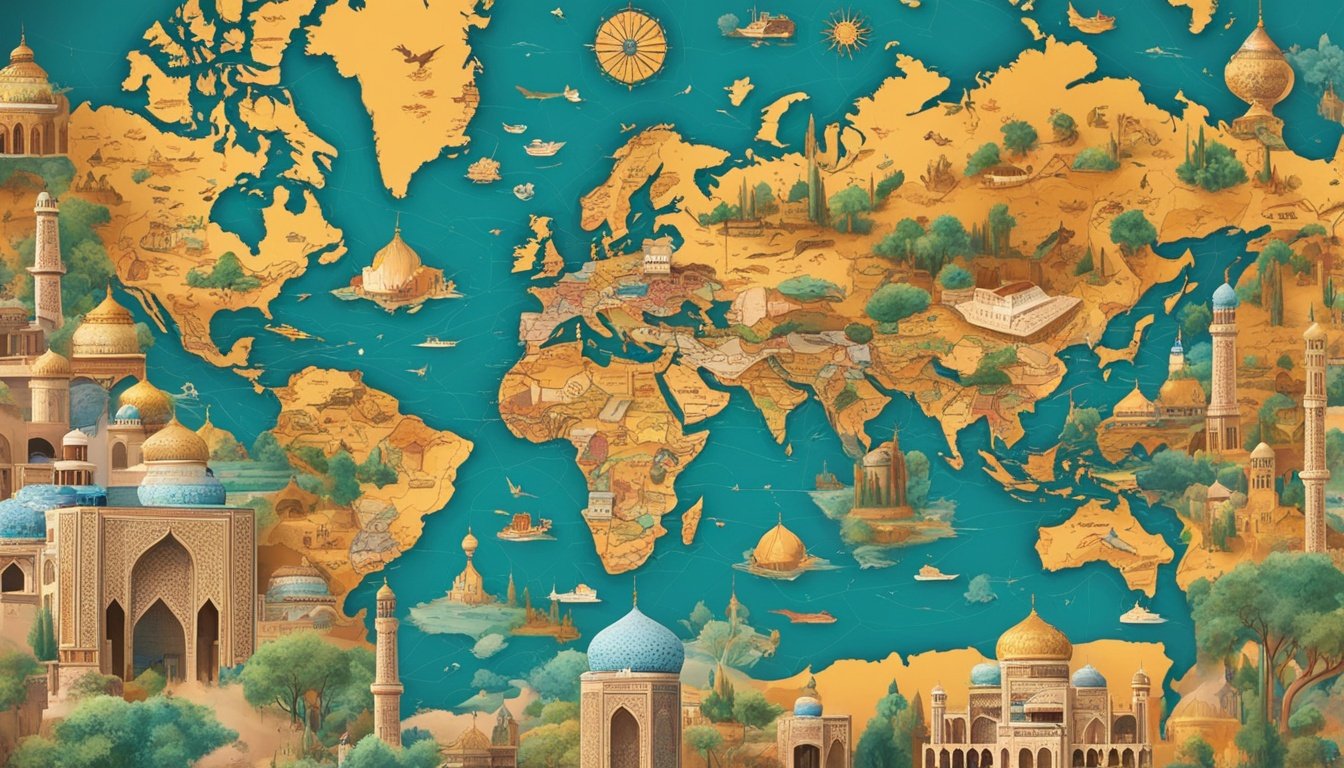Islamic Finance in Different Regions
What if the future of global finance isn’t rooted in traditional banking, but rather in a system guided by Sharia principles? As we explore the vast landscape of Islamic finance across different regions, it’s essential to recognize that this $3.9 trillion industry, which stretches across over 80 countries, is not only reshaping financial practices but also challenging many preconceived notions of what Islamic banking entails. Major players like Saudi Arabia, Iran, and Malaysia dominate the market, holding substantial shares in Sharia-compliant assets. With a growth rate of around 10% annually, the sector is expected to surge to $5.95 trillion by 2026. Join us as we delve deeper into the current trends, innovations, and future potentials of Islamic finance in various regions around the globe.
Introduction to Islamic Finance
Islamic finance is a distinctive financial system guided by ethical principles rooted in Sharia law. Investors benefit from an introduction to Islamic finance that emphasizes risk-sharing and money management without engaging in interest-based transactions. The foundations of Islamic finance create a framework that allows for fair distribution of wealth and social justice.
Core to the Islamic finance principles is the prohibition of Riba, or interest, which drives the need for alternative financing methods. Contracts like murabaha and musharakah offer opportunities for ethical investment, fostering growth in various sectors without compromising moral standards. Over 560 banks and more than 1,900 mutual funds worldwide operate under these principles, providing diverse options for both Muslim and non-Muslim investors.
The industry has shown remarkable growth, with Islamic financial assets expanding from about $2.17 trillion in 2015 to approximately $4 trillion by 2021. Projections indicate that this portfolio may reach around $5.9 trillion by 2026. Such growth demonstrates the increasing demand for Sharia-compliant financial services and products, which now exist in various regions including the UK.
Understanding the foundations of Islamic finance involves exploring its structure, core values, and the commitment to operate in ways that promote ethical investments. As investing grows more accessible, Islamic finance continues to present viable alternatives to conventional banking while upholding its unique principles.
The Growth of the Islamic Finance Industry
The Islamic finance industry has experienced remarkable expansion over recent years. As of 2023, the global market size of Islamic finance is valued at approximately $3.9 trillion, underscoring its increasing significance in the financial landscape. Various factors contribute to the continuous growth of this sector, especially as ethical investment becomes more desirable worldwide.
Current Global Market Size and Predictions
The Islamic finance industry growth is projected to continue well into the future. With assets expected to reach $5.95 trillion by 2026, the market is set for substantial advancement. The Gulf Cooperation Council (GCC) remains a powerhouse, holding around 45.4% of global Islamic finance assets. Other key regions include South Asia and Southeast Asia, which collectively account for significant portions of this expanding market.
Innovative financial products and technological integration, such as the rise of Islamic robo-advisors and blockchain utilization, enhance the operational efficiency of institutions, further driving the evolution of Islamic banking. Moreover, the growing accessibility of Sharia-compliant finance across over 80 countries indicates a broadening base of participants within the global market.
Historical Development of Islamic Finance
The historical development of Islamic finance dates back to the mid-20th century when serious efforts began to establish frameworks for Sharia-compliant financial systems. Initial growth was facilitated by the creation of institutions like the Islamic Development Bank in the 1970s. These advancements laid the groundwork for today’s diverse suite of Islamic financial products.
Over time, the evolution of Islamic banking led to a proliferation of services that cater to the ethical demands of investors while ensuring compliance with Islamic law. As a result, Islamic finance has not only attracted Muslim populations but has also gained traction in non-Muslim markets, reflecting a growing awareness of the benefits associated with ethical investments.
Islamic Finance in the Middle East
The Middle East stands as a pivotal region for Islamic finance, with a robust framework supporting its growth. The region is characterized by its diverse financing options that adhere to Shariah principles, such as interest-free financing models like Murabaha. This approach has enabled Islamic banks in the Arab world to thrive, with significant contributions from the Gulf Cooperation Council (GCC) countries.
Leading Countries in Islamic Banking
Among the leading countries in Islamic banking, Saudi Arabia and Iran dominate the landscape, controlling approximately 25-30% of the total Islamic finance market in the Middle East. Other notable players include the United Arab Emirates, Kuwait, and Qatar, which significantly contribute to the total assets held by Islamic banks in the Arab world. The presence of over 190 Islamic banks further establishes this region as a center for Islamic finance, fostering an environment for innovation and growth.
Market Share Comparison Among Arab Countries
The market share of Islamic banking in Arab countries varies widely, reflecting diverse regulatory frameworks and economic conditions. Sudan is unique, showcasing a 100% Islamic banking system, whereas Saudi Arabia follows closely with a market share of around 74.9%. On the other hand, countries like Algeria and Tunisia have much lower percentages, illustrating the complexities faced in the adoption of Sharia-compliant financial products. Understanding these dynamics is crucial for experiencing the full scope of Islamic finance in the Middle East.
Islamic Finance in Southeast Asia
Islamic finance in Southeast Asia has gained remarkable traction in recent years, with Malaysia at the forefront, serving as a comprehensive model for Sharia-compliant finance. The region boasts a significant Muslim population, which naturally fuels the demand for Islamic financial products and services. A notable statistic is that Southeast Asia was estimated to reach $685 billion in Islamic finance assets in 2019, positioning it as a key player in this industry.
Malaysia as a Benchmark for Sharia-Compliant Finance
Malaysia Islamic banking stands out with approximately 25% of its financial sector comprising Sharia-compliant assets. This country has developed a robust framework that effectively integrates Islamic financial principles, such as profit and loss sharing contracts and interest prohibition. Kuala Lumpur serves as a hub for sukuk issuance, drawing interest from global investors. The Islamic Financial Services Board, located in Malaysia, plays a crucial role in establishing global standards for Islamic finance, influencing practices beyond its borders.
Emerging Markets: Indonesia and Bangladesh
Indonesia and Bangladesh represent emerging Islamic finance markets in Southeast Asia. Although Indonesia hosts the largest Muslim-majority population globally, Islamic banking in Indonesia accounts for only about 8% of total banking assets. The government is actively pursuing initiatives to enhance Islamic banking practices and financial literacy, as the Islamic financial literacy index is comparatively low at 9.1%. Recent efforts include the development of diversified financial products catering to a broader audience, further demonstrating Indonesia’s potential as a significant player in the Islamic finance arena.
Bangladesh has also been making strides, albeit at a slower pace. The government has engaged in legislative reforms to facilitate the growth of Islamic banking, encouraging financial institutions to introduce Sharia-compliant products. As these countries work towards expanding their markets, the demand for Islamic financial services continues to rise, highlighting the region’s growing influence on the global Islamic finance landscape.
Islamic Finance in Africa
The landscape of Islamic finance in Africa is dynamically evolving, driven by the significant need for development funding. Recent trends in Sub-Saharan Islamic finance indicate a growing recognition of *sukuk*, a Sharia-compliant bond, as a strategic financial tool for infrastructure projects and attracting investments. By capitalizing on the growth potential of Islamic finance, African nations aim to close the over $100 billion financing gap that the continent currently faces.
Current Trends in Sub-Saharan Islamic Finance
In recent years, countries like Nigeria and South Africa have taken considerable steps towards integrating Islamic finance principles into their financial systems. With Islamic banking assets dominating the market, over 60% of these institutions focus on supporting small and medium-sized enterprises (SMEs). This commitment to economic empowerment is complemented by financing initiatives aimed at social welfare, including education and healthcare.
Growth Potential and Sovereign Issuance of Sukuk
Islamic finance not only presents an opportunity for funding but also serves as a means of economic rejuvenation. The issuance of sukuk in Africa has gained momentum, with over $4.3 billion raised since 2014. Countries such as Egypt and Senegal are also exploring sukuk as a viable option for public project financing. The establishment of robust regulatory frameworks is essential for unlocking the true growth potential of Islamic finance in Africa, as these guidelines help streamline processes and enhance investor confidence.
Islamic Finance in Europe
Islamic finance in Europe has gained significant traction, with the UK emerging as a key player in this financial sector. The UK’s pioneering efforts in establishing a framework for UK Islamic banking make it the principal hub for Islamic finance in the West. With five licensed Islamic banks operating and a diverse range of Sharia-compliant products available, the country offers various pathways for ethical investment. The interest in these products extends beyond Muslim investors, as the appeal of ethical finance continues to grow among the broader population.
The UK’s Role in Western Islamic Finance
The establishment of the first sovereign sukuk in 2014 by the UK government marked a milestone for Islamic finance in Europe. This initiative encouraged both domestic and international investors to explore opportunities within the Islamic finance sector. The UK’s regulatory framework, coupled with its strong financial markets, has provided a conducive environment for the expansion of Islamic banking, making it a benchmark for other countries in Europe.
France and Germany: Emerging Islamic Finance Markets
France and Germany represent emerging markets in Europe for Islamic finance. France is home to a substantial Muslim population, which creates a promising landscape for Sharia-compliant financial products. Although some banks remain hesitant due to reputational concerns, the growth potential for Islamic finance in France is noteworthy.
Germany has made headway in Islamic finance, evidenced by the establishment of its first fully-functioning Islamic bank and the issuance of multiple sukuks. This progress reflects a growing acceptance of Islamic finance in the country. As these nations embrace Islamic finance, they boost their profiles within the broader landscape of Islamic finance in Europe.
Islamic Finance in North America
Islamic finance in North America is at a formative stage but shows promising growth potential. The Muslim population in the United States, estimated at approximately 3.45 million, contributes to an increasing demand for financial products that comply with Sharia principles. With, about 2.8 million Muslim households characterized as larger, younger, and more affluent than the average American households, the interest in US Islamic banking products is expected to rise throughout the region.
Islamic Banking Products in the US
The landscape for Islamic banking products in the US features a limited but expanding array of options. While only a small number of institutions offer formal Islamic financing, notable entities such as Guidance Residential and Devon Bank have carved significant niches in the market. Guidance Residential has pioneered Sharia-compliant home financing since 2002, promoting interest-free financing contracts.
Organizations like Saturna Capital’s Amana Mutual Fund and University Islamic Financial are examples of how Islamic finance is making inroads, managing assets and providing tailored financial services to prospective clients. Despite the limited number of available products, the expanding community and rising awareness among Muslims regarding ethical and Sharia-compliant investment options hint at substantial growth potential.
The collaboration with traditional financial organizations, including partnerships with Freddie Mac and Fannie Mae, demonstrates an effort to integrate US Islamic banking products into the broader financial market. Challenges such as regulatory compliance and the need for unique product structures remain, but many institutions are actively navigating these hurdles to serve the growing Muslim demographic.
Regional Islamic Finance Markets Overview
Islamic finance regulations play a critical role in shaping the landscape of financial markets across various regions. Each area exhibits distinct regulatory differences in Islamic finance that influence how institutions operate and interact with customers. Understanding these frameworks is essential for recognizing the potential for growth and innovation within the sector.
Differences in Regulation and Compliance
The regulatory environment for Islamic finance varies widely. In the Gulf Cooperation Council (GCC) nations, comprehensive frameworks facilitate the development of Islamic banking products and services. The strong regulatory foundation allows for a seamless operation of over 190 Islamic banks within the Middle East and North Africa (MENA) region. In contrast, African nations such as Uganda are beginning to create their regulatory structures, with Uganda recently licensing its first sharia-compliant bank in March 2024.
Regional Challenges and Opportunities
Challenges in Islamic finance are prevalent across different regions, impacting their ability to attract investments. For example, regulatory hurdles in Africa often hamper growth, while competition in the Middle East places additional pressure on emerging markets. Despite these obstacles, significant opportunities are apparent. Countries can leverage Islamic finance as a tool for development, tapping into the potential for sharia-compliant products to attract investment. As legal frameworks improve and markets mature, prospects for Islamic banking markets are set to broaden.
Global Islamic Finance Trends
The trends in global Islamic finance indicate an increasing appetite for Sharia-compliant finance driven by a strong demand for ethical investments and a rising awareness of sustainability. Growth expectations suggest that the global Islamic finance industry will likely experience high-single-digit growth rates in 2024 and 2025.
Key developments underline the dynamic changes in this sector:
- Saudi Arabia’s Islamic banks recorded slightly lower growth compared to their global counterparts.
- Kuwait experienced a sharp decline following inflated performance levels in 2022 due to a major acquisition.
- The UAE’s Islamic finance growth surged in 2023, supported by robust non-oil economic performance.
- Sukuk issuances are projected to fall between $160 billion and $170 billion in 2024.
- As of March 31, 2024, total sukuk issuance increased to $46.8 billion from $38.2 billion the previous year.
- The takaful sector is expected to grow at an annual rate of around 10%.
Despite these positive trends, challenges remain. Countries focusing on Islamic finance have made only a modest contribution of 15% to the industry’s incremental growth in 2023. Notably, the Islamic banking assets growth contributed 56% to overall industry growth, a decline from 72% in 2022.
With Asia-Pacific controlling about 40% of the global Islamic finance industry, Malaysia stands out as the largest market, holding around 35% of market share. Europe has experienced a notable surge in Sharia-compliant financial services, showcasing a growth increase of over 20% in the past five years, underscoring the future of Sharia-compliant finance in this region.
The Impact of Sharia Compliance on Economic Growth
The significance of Sharia compliance in the context of economic growth cannot be overstated. In over 75 countries, Islamic banking operates through approximately 300 institutions, indicating a robust global landscape for Islamic finance. The Sharia compliance economic impact extends beyond conventional financial systems, as it inherently promotes responsible investing practices while emphasizing ethical frameworks.
How Islamic Finance Contributes to Sustainable Development
Countries where Muslims constitute a significant portion of the population often experience a stronger diffusion of Islamic banks. Despite the initial perception, Islamic banks do not correlate heavily with economic growth indicators. Instead, they often reduce the GDP growth’s predictive capability based on initial GDP per capita. This relationship highlights how the essence of Islamic finance lies not just in profit generation but in contributing to sustainable development as well.
Through the active management of ethical standards, Islamic finance encourages investments in socially responsible projects. By steering clear of industries that could have detrimental effects on society, Islamic finance fosters community development initiatives. The principles behind these institutions resonate with sustainable development goals, demonstrating their focus on long-term societal impact rather than short-term gains.
Additionally, the growing emphasis on Environmental, Social, and Governance (ESG) principles within Islamic finance opens up further avenues for positive economic impact. The Gulf Cooperation Council (GCC) region leads the way, holding 45.4% of global Islamic finance assets, while South Asia and Southeast Asia further contribute to the landscape. These statistics underscore how Sharia compliance plays a pivotal role in enhancing economic development through sustainable practices.
Conclusion
The growth of Islamic finance across diverse regions underscores a collective turn towards ethical and sustainable financial practices. This movement extends beyond Muslim investors, appealing to a broader audience by promoting principles that align with social responsibility. As we reflect on the key factors influencing this growth, it’s evident that innovative models in Islamic banking foster profit-sharing mechanisms, which serve to empower depositors and entrepreneurs alike.
A summary of Islamic finance trends indicates that the total Islamic banking and capital assets reached an impressive $2.44 trillion in 2020, driven largely by a robust performance in the GCC region. The sustained growth of 18% during challenging financial crises highlights the resilience of this sector, showcasing that Islamic finance is not only viable but increasingly favored in various markets. Despite facing challenges like the need for a stronger legal framework and banking infrastructure, the future remains bright as institutions seek to devise innovative non-interest-based financing solutions.
In conclusion on Islamic finance, as it continues to adapt and thrive on a global scale, we anticipate the emergence of more sophisticated regulatory frameworks and financial instruments. This evolution will not only enhance the effectiveness of Islamic finance but also bolster its role as a catalyst for economic growth and sustainability in both Muslim and non-Muslim nations.
Source Links
- Sukuk drive Islamic financing across MENAT
- Islamic Banking and Finance Definition: History and Example
- What is Islamic finance?
- Islamic Financial Institutions: An Introduction
- The Growing Global Appeal of Islamic Finance
- Islamic Finance: Just For Muslim-Majority Nations? – Global Finance Magazine
- Islamic Finance
- Council Post: E-Commerce And Islamic Finance: Harmonizing Traditions In The Middle East
- The Rise of Islamic Finance
- Islamic Finance & ESG investing
- The efficiency of Islamic Banks in the Southeast Asia (SEA) Region – Future Business Journal
- From principles to practice: Shariah investing in Southeast Asia
- Islamic financing gaining ground in African countries – CNBC Africa
- Islamic Finance in Africa: The Prospects for Sustainable Development
- Islamic finance in Europe
- No title found
- Famous Islamic Finance Institutions in the US – Musaffa Academy
- Islamic Finance in the United States: A Small but Growing Industry
- Spotlight: Islamic financing and investment structures in USA
- Navigating Uncertainty: Global Islamic finance assets expected to exceed 6.7 trillion by 2027
- Islamic Finance 2024-2025: Resilient Growth Anticipated Despite Missed Opportunities
- Islamic finance: global industry on track towards projected growth
- The Role of Islamic Banking in Economic Growth
- Financing and returns of Shari’ah-compliant contracts and sustainable investing in the Islamic banking of Oman
- No title found
- Financial intermediation through risk sharing vs non-risk sharing contracts, role of credit risk, and sustainable production: evidence from leading countries in Islamic finance







